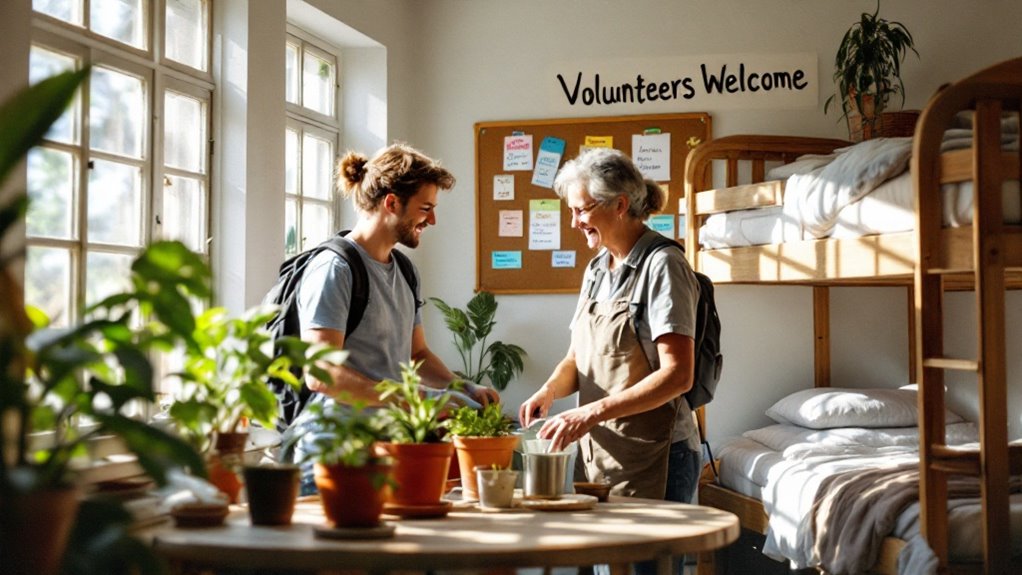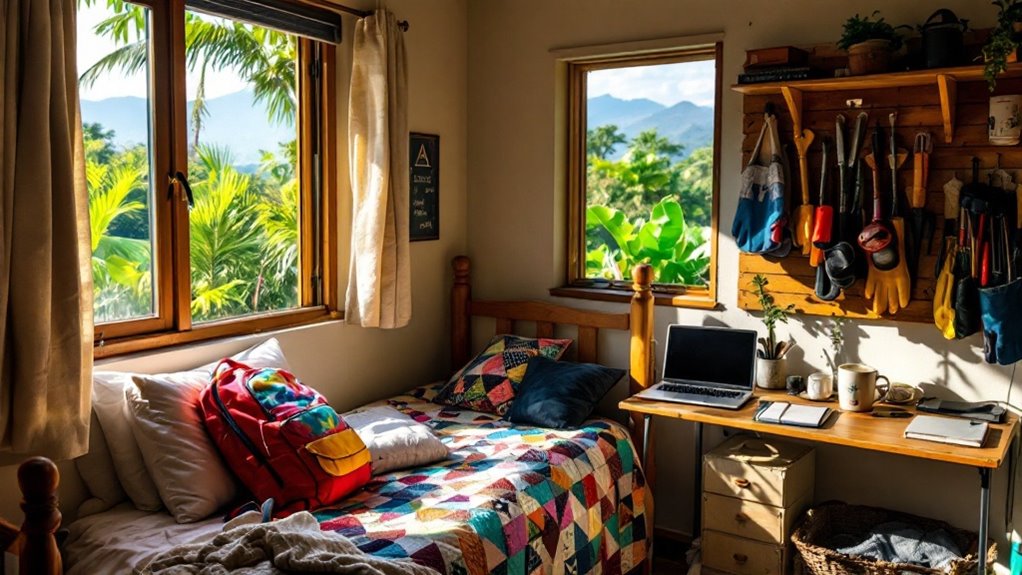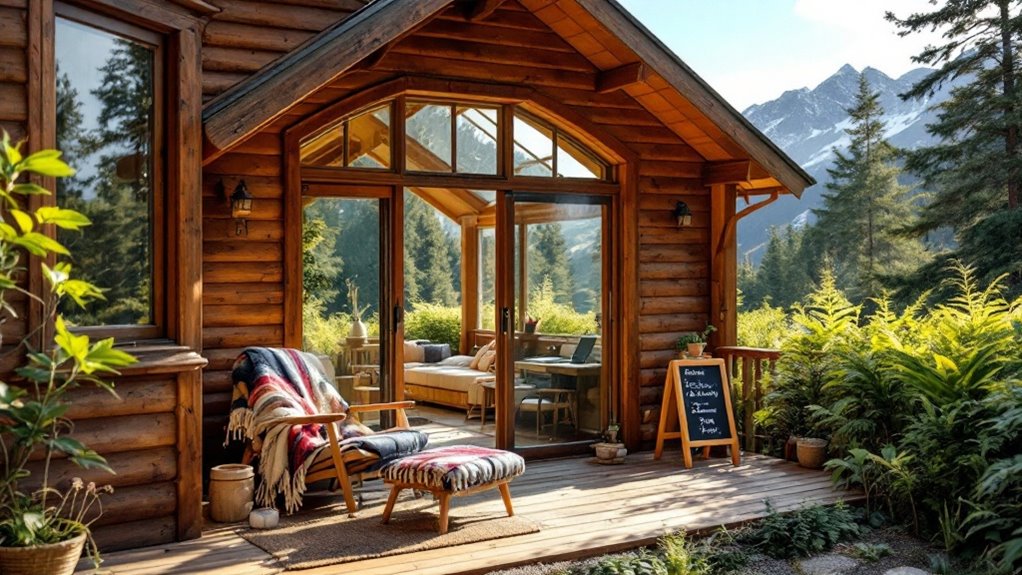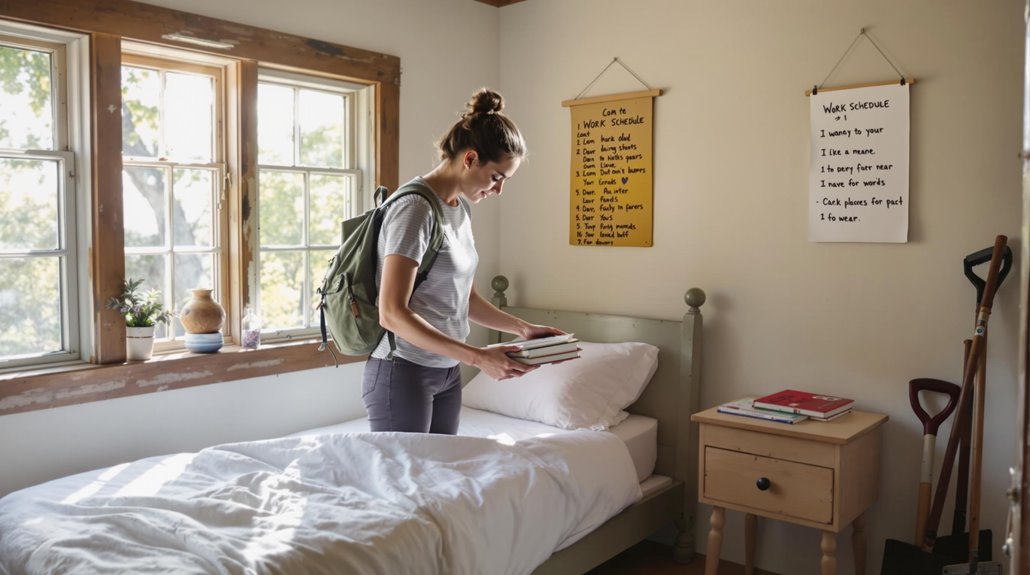Global travelers often overlook one of the most rewarding ways to explore the world: work-exchange programs. You’ll find thousands of hosts worldwide who’ll offer you a free bed and meals in exchange for your help with their farms, hostels, or family businesses. While you won’t be lounging by the pool all day, you’ll gain authentic cultural experiences and save hundreds on accommodation costs. If you’re willing to dedicate 20-30 hours weekly to meaningful work, an entire world of budget-friendly adventures awaits.
- Key Points
- Understanding Work-Exchange Programs and Their Benefits
- Top Platforms for Finding Volunteer Accommodation
- Essential Tips for Securing the Best Volunteer Housing
- Different Types of Free Accommodation Options
- Making the Most of Your Volunteer Living Experience
- Safety and Vetting Guidelines for Accommodation Choices
- Best Destinations for Quality Volunteer Housing
- Budgeting and Hidden Costs to Consider
- Building Relationships With Host Families and Organizations
- Maximizing Cultural Immersion Through Volunteer Housing
- The Sum Up
Key Points
- Join platforms like Worldpackers, Workaway, or WWOOF to connect with hosts offering accommodation in exchange for 20-30 hours weekly work.
- Choose between hostel work, farm stays, or teaching opportunities that match your skills and provide free housing plus meals.
- Read past volunteer reviews carefully and verify program requirements to avoid hidden costs beyond basic accommodation and meals.
- Consider house-sitting or boat crewing opportunities as alternatives to traditional volunteer programs for free accommodation while traveling.
- Select destinations like Costa Rica, Ecuador, or Bali where established volunteer housing programs offer affordable weekly rates and culture.
Understanding Work-Exchange Programs and Their Benefits

While traditional travelers drain their savings on expensive hotels, savvy globetrotters are discovering the transformative world of work-exchange programs.
You’ll trade a few hours of work daily for free accommodation and often meals, slashing your biggest travel expense while gaining authentic cultural experiences.
These programs offer far more than just cost savings. Affordable Adventures can help you discover a wide range of money-saving strategies for budget travel.
Work-exchange programs unlock authentic cultural experiences that transform ordinary trips into deeply meaningful journeys of connection and growth.
You’ll learn about local communities, learning directly from hosts who become your gateway to authentic cultural experiences.
Whether you’re helping at a bustling hostel in Barcelona, tending to an organic farm in New Zealand, or teaching English to a family in Japan, you’ll develop valuable skills while building lasting connections worldwide.
Most programs require 20-30 hours of work weekly, leaving plenty of time to explore.
You’re not just a tourist – you’re becoming part of the community.
Popular platforms like WWOOF and Helpx connect volunteers with hosts worldwide, making it easy to find your ideal exchange opportunity.
Top Platforms for Finding Volunteer Accommodation
Ready to commence your work-exchange journey? You’ll find several trusted platforms that’ll connect you with hosts worldwide.
Worldpackers stands out with its robust safety features and 24/7 support across 170 countries, while Workaway offers the widest reach with opportunities in 178 countries.
For farm enthusiasts, WWOOF specializes in organic farming experiences, and HelpX provides similar opportunities with a free basic membership. All volunteers receive hassle-free experiences with comprehensive program organization and support throughout their stay.
Studying abroad can provide invaluable personal growth, and these platforms can help you achieve that while also saving on accommodation costs.
If you’re seeking structured programs, VolunteerHQ offers affordable options starting at $20 per day.
Each platform has its sweet spot: Worldpackers charges $49 annually, Workaway costs €36, and both offer extensive user reviews.
While membership fees might seem like an investment, you’ll save considerably on accommodation and food while gaining invaluable cultural experiences and local connections.
Essential Tips for Securing the Best Volunteer Housing

Before diving into volunteer housing opportunities, you’ll need a strategic approach to secure the best accommodations for your travel adventure. Start by researching programs that align with your skills and interests while offering quality housing options – whether it’s dormitory-style living or cultural homestays.
Don’t skip the vital step of reading past volunteer reviews and thoroughly checking program requirements. You’ll want to understand exactly what’s included in your accommodation package and any additional costs you might face. Some programs require volunteers to chip in for housing or travel expenses. Remember to pack appropriately with sturdy closed-toe shoes and weather-suitable clothing for your volunteer housing experience.
Remember to set realistic expectations about living conditions and be ready to adapt. The best volunteer housing experiences often come when you’re flexible and prepared for shared spaces, different cultural norms, and varying comfort levels.
Different Types of Free Accommodation Options
When it comes to scoring free accommodation worldwide, savvy travelers have numerous creative options at their fingertips.
You can engage in volunteer work, exchanging your skills for housing at hostels, farms, or conservation projects through platforms like Worldpackers. Ethical tourism in Cambodia offers a unique opportunity to experience sustainable and community-focused travel initiatives.
House-sitting offers a home-away-from-home experience while caring for properties and pets, easily arranged through TrustedHousesitters.
If you’re socially adventurous, try couch surfing to connect with locals and experience authentic cultural exchanges.
For maritime enthusiasts, boat life beckons – trade your labor for sailing adventures along stunning coastlines.
Want a more structured arrangement? Consider home exchanges, where you’ll swap your residence with fellow travelers through platforms like HomeExchange.
Each option carries unique perks, from building meaningful connections to exploring destinations from a local’s perspective. These alternative accommodation methods have helped travelers save over $100,000 on lodging expenses over the past decade.
Making the Most of Your Volunteer Living Experience

Making your volunteer living experience truly count requires a strategic blend of personal growth and community impact.
You’ll want to dive deep into cultural exchange activities while staying mindful of local customs and traditions. Focus on building meaningful connections within the community and sharing your skills in ways that create lasting value. Plus, essential insights for a successful study abroad journey can help guide your experience.
Don’t forget to carve out time for personal development and reflection. Whether you’re teaching English in Thailand or helping at an eco-lodge in Costa Rica, you’ll gain the most by balancing volunteer work with self-care. Engaging in physical volunteer activities like swinging a hammer can provide excellent exercise while contributing to the community.
Network with fellow volunteers and locals, document your experiences, and regularly assess your impact.
Stay committed to sustainable practices and respect local priorities. Remember, you’re not just getting free accommodation – you’re creating a transformative experience that benefits both you and your host community.
Safety and Vetting Guidelines for Accommodation Choices
Safe accommodations form the bedrock of any successful volunteer travel experience. Before you engage in a volunteer opportunity, thoroughly research the organization’s reputation and read reviews from past volunteers.
Finding safe lodging through reputable organizations is essential for successful volunteer travel – research thoroughly and verify past volunteer experiences.
You’ll want to verify they provide basic amenities, proper sanitation, and secure living quarters. Smart financial planning is also crucial when budgeting for your volunteer trip.
Don’t skip the essential safety checks. Make sure your host organization offers emergency protocols, local security briefings, and a clear incident reporting system. Consider discussing any concerns with past volunteer friends who can share firsthand experiences.
They should provide you with emergency contacts and detailed information about the accommodation’s location and surrounding area.
Remember to secure travel insurance if it’s not included, stay aware of local crime rates, and respect cultural norms.
Always maintain clear communication with your host about expectations, whether you’re sharing space or have private quarters, and how meals are arranged.
Best Destinations for Quality Volunteer Housing

Several destinations stand out for their exceptional volunteer housing opportunities, offering the perfect blend of comfort, culture, and affordability.
You’ll find incredible value in Costa Rica’s homestay programs, where you’ll live with local families while working on education or conservation projects for just $380 weekly.
Ecuador’s homestay options in Quito let you learn about local life while exploring the Galapagos and Amazon, starting at only $270 per week.
If you’re drawn to Asia, Bali’s shared volunteer houses create a vibrant community atmosphere at $325 weekly, perfect for solo travelers. With flexible booking policies, volunteers can adjust their travel dates up until two weeks before the program starts.
Sri Lanka combines both homestays and volunteer houses, ideal for experiencing its rich culture firsthand.
For the budget-conscious, Peru’s homestay programs in Cusco start at $250 weekly, putting you right in the heart of Incan heritage.
Budgeting and Hidden Costs to Consider
Seasoned travelers know that volunteer accommodation isn’t always as “free” as it seems. While organizations like IVHQ offer stays from just $20 per day, you’ll need to budget for significant hidden costs.
Program fees typically cover your bed, meals, and basic support, but you’re on your own for airfare, visas, and insurance. For example, Habitat for Humanity trips typically cost between $1,500-2,000 per person for a one-week stay. Mastering your finances for a successful semester abroad can help you better estimate and plan for these expenses.
While program fees cover essentials like lodging and food, remember to budget separately for crucial travel costs like flights and insurance.
Don’t let this deter you – smart planning can make volunteer travel affordable. Start by researching work-exchange programs that offer accommodation for your skills.
Create a detailed budget that includes personal expenses, local transport, and emergency funds. Consider fundraising to offset program fees, and use budgeting apps to track every dollar.
Building Relationships With Host Families and Organizations

While finding free accommodation through host families can be exciting, building meaningful relationships with them takes thoughtfulness and cultural awareness.
You’ll want to fully learn about their daily routines, from sharing meals to participating in family activities, while respecting their customs and house rules.
Make an effort to communicate openly with your hosts, even if you’re still learning the language. The opportunity to stay with these families can help you improve your Spanish skills significantly through daily practice and conversations.
You’ll find that most families are enthusiastic to help you improve your language skills through daily conversations. Navigating vegetarian dining as a student abroad can be made easier by communicating your dietary needs with host families.
Remember that they’ve been carefully vetted by organizations and trained to support international guests like you.
Show genuine interest in their culture and traditions, but also maintain healthy boundaries.
Many volunteers develop lifelong connections with their host families by striking this perfect balance between integration and independence.
Maximizing Cultural Immersion Through Volunteer Housing
Living with locals through volunteer housing opens up incredible opportunities for authentic culture that you simply can’t get from traditional accommodations.
When you learn about daily community life, you’ll pick up the local language faster, understand cultural nuances, and build lasting connections that transform your travel experience. Many host families are volunteer participants looking to facilitate meaningful cultural exchange with minimal fees.
To maximize your culture while volunteering, follow these proven strategies:
- Actively participate in community events and family gatherings – don’t just observe from the sidelines.
- Learn basic phrases in the local language before arrival, then practice daily with your hosts.
- Show genuine interest in local traditions by asking thoughtful questions and joining in ceremonial activities.
Remember to maintain cultural sensitivity and clear communication about your work responsibilities.
This balance guarantees both you and your host community benefit from the exchange.
The Sum Up
Pack your bags, open your mind, and embrace the world of volunteer housing. You’ll save money, forge lasting friendships, and gain invaluable cultural insights. Whether you’re tending gardens in Thailand, teaching English in Ecuador, or helping at hostels in Hungary, work-exchange programs offer more than just free accommodation – they’re your gateway to authentic travel experiences. Start planning, start connecting, and start living like a local.

